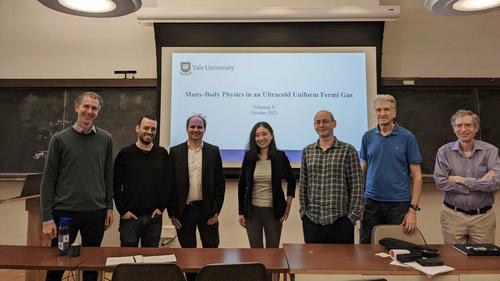
On October 27, 2023, Yunpeng Ji, successfully defended the thesis, “Many-Body Physics in an Ultracold Uniform Fermi Gas” (advisor: Nir Navon).
Yunpeng explained, “Interacting Fermi systems are among the most captivating systems in the realm of physics as they exhibit diverse quantum phenomena. Research on these systems not only deepens our understanding of fundamental quantum principles but also holds promise for practical applications in fields such as superconductivity, topological insulators, and quantum computing. Ultracold atomic quantum gases, in particular, offer a highly controllable platform for investigating the quantum behavior of matter. Researchers can precisely manipulate parameters like temperature, density, and interactions in these gases, allowing for the study of complex many-body phenomena. In my thesis work, I focus on the preparation of a uniform ultracold Fermi gas and its use as a powerful tool to study the intricacies of many-body physics. This endeavor unveils a myriad of captivating phenomena, ranging from the metastability of a repulsive Fermi gas with contact interactions to the emergence of the Joule-Thomson effect driven by quantum correlations.”
Yunpeng continues, “I’m going to be a postdoc at Stanford university.”
Thesis Abstract:
Ultracold atomic gases, traditionally produced in harmonic traps, have been a successful platform in studying many-body problems. Recent developments in homogeneous quantum gases in optical box potentials have introduced new opportunities for investigating complex problems without the complications arising from the density inhomogeneity, enabling more straightforward comparisons with theories. In this presentation, I will introduce the production of a uniform Fermi gas composed of Li-6 atoms and outline four projects that leverage this pristine experimental environment: (I) Stability of the repulsive Fermi gas with contact interactions. We identify that the primary decay mechanism of the gas is a universal three-body recombination process towards the formation of Feshbach molecules. (II) Fermionic Joule-Thomson effect. We investigate the temperature dynamics of a homogeneous Fermi gas during isenthalpic rarefaction. (III) Decay of a strongly interacting Fermi gas. We observe exponential decay of the gas in the BEC-BCS crossover and explore the effect of light on atom losses. (IV) Excitation and observation of sound waves in degenerate Fermi gases. We observe the emergence of sound in a Fermi liquid, and investigate the acoustic response beyond the linear response regime in both the weakly and strongly interacting Fermi gases.